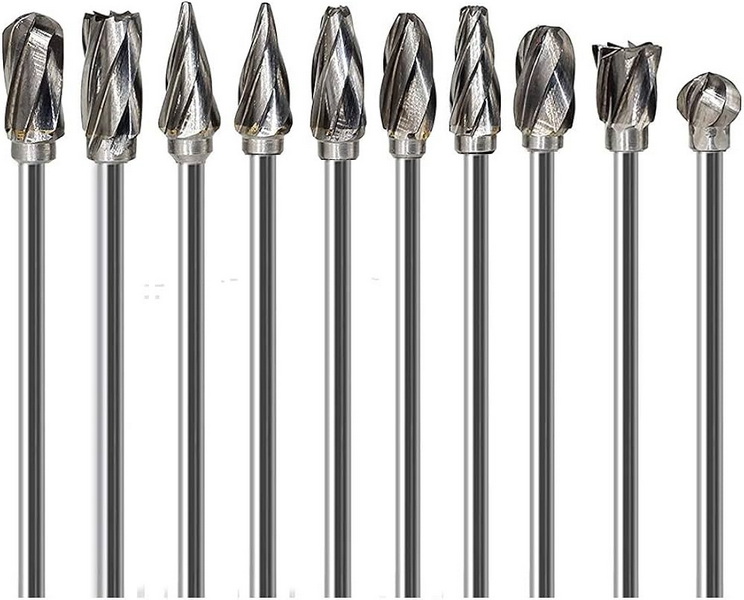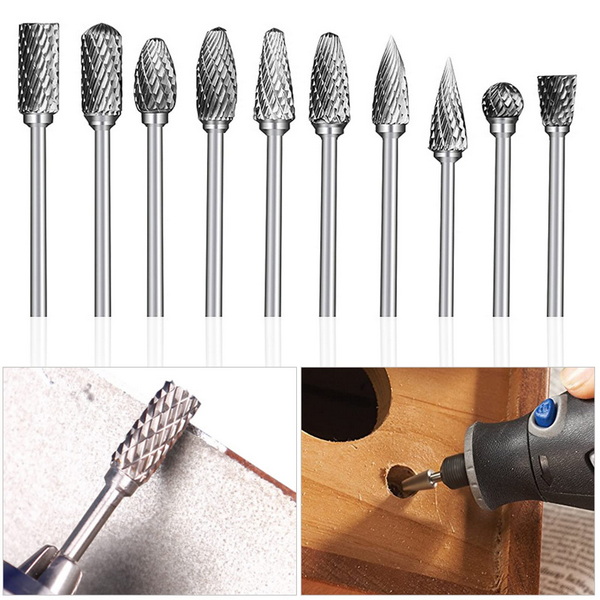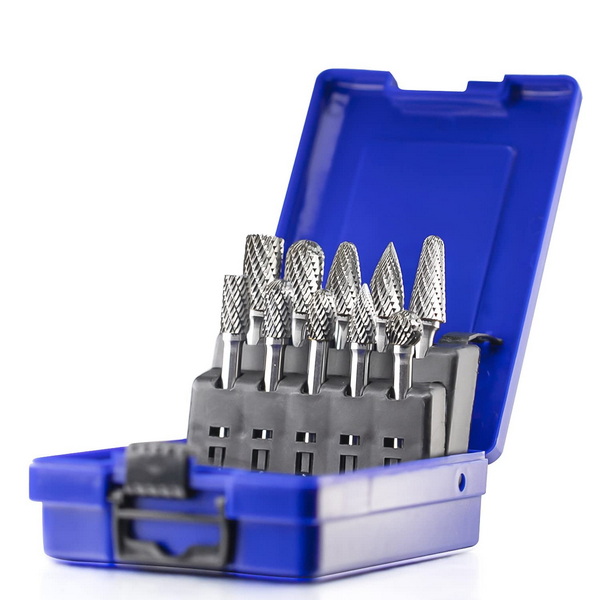Content Menu
● Introduction to Tungsten Carbide Router Bits
>> Types of Router Bits
● Tools Needed for Sharpening
>> Diamond Stones
● Steps to Sharpen Tungsten Carbide Router Bits
>> Step 1: Clean the Bit
>> Step 2: Remove the Bearing (If Applicable)
>> Step 3: Position the Diamond Stone
>> Step 4: Sharpen the Bit
>> Step 5: Test the Bit
● Tips for Maintaining Router Bits
● Advanced Sharpening Techniques
>> Diamond Grinding Wheels
>> EDM and Laser Sharpening
● Cooling and Tool Life
● Maintenance and Care Beyond Sharpening
>> Regular Inspection
>> Gentle Handling
>> Proper Storage
● Common Mistakes to Avoid
● Conclusion
● FAQ
>> 1. What Tools Are Needed to Sharpen Tungsten Carbide Router Bits?
>> 2. How Often Should I Sharpen My Router Bits?
>> 3. Can I Use a Regular Sharpening Stone for Carbide Bits?
>> 4. What Are the Benefits of Using Tungsten Carbide Router Bits?
>> 5. Can I Sharpen Diamond Router Bits?
● Citations:
Tungsten carbide router bits are renowned for their durability and ability to maintain sharpness over time, making them a staple in woodworking projects. However, like all cutting tools, they eventually become dull and require sharpening to maintain optimal performance. Sharpening tungsten carbide router bits can seem daunting due to their complex profiles and hard material composition, but with the right techniques and tools, it's a manageable task. This article will guide you through the process of sharpening tungsten carbide router bits, including the necessary tools, steps, and tips for maintaining these valuable tools.

Introduction to Tungsten Carbide Router Bits
Tungsten carbide router bits are made from a combination of tungsten carbide and a metal binder, typically cobalt. This composition provides exceptional hardness and wear resistance, allowing the bits to withstand high-speed operations and maintain sharpness longer than bits made from other materials like High-Speed Steel (HSS). However, their hardness also means they require specialized sharpening tools.
Types of Router Bits
Router bits come in various shapes and sizes, each designed for specific tasks:
- Straight Bits: Used for creating grooves, dadoes, and rabbets.
- Trim Bits: Ideal for laminate trimming.
- Cove Bits: Produce concave profiles for decorative edges.
- Rabbeting Bits: Create rabbet joints.
- Chamfer Bits: Create beveled edges.
- Edge-Forming Bits: Produce various edge profiles.
- Specialty Bits: Include dovetail and stile & rail bits for precision tasks.
Tools Needed for Sharpening
To sharpen tungsten carbide router bits, you'll need a few specialized tools:
1. Diamond Stone or Diamond File: These are essential for sharpening carbide. A double-sided diamond stone with coarse and fine grits is ideal.
2. Cleaning Solution: To remove resin and debris from the bit.
3. Allen Wrench: For removing bearings if your bit has one.
4. Workbench and Clamp: For securing the diamond stone during sharpening.
Diamond Stones
Diamond stones are preferred for sharpening carbide due to their hardness and ability to efficiently remove material without damaging the bit. A double-sided stone offers both coarse and fine grits, allowing for initial sharpening and final polishing.
Steps to Sharpen Tungsten Carbide Router Bits
Step 1: Clean the Bit
Before sharpening, clean the bit to remove any resin or debris. Use a cleaning solution and a soft brush to avoid damaging the carbide. Regular cleaning is crucial to maintain the cutting edge and prevent buildup that can dull the bit prematurely. A wire brush or solvent can also be effective for removing stubborn residues[1][2].
Step 2: Remove the Bearing (If Applicable)
If your router bit has a bearing, remove it using an Allen wrench. This ensures the bearing doesn't interfere with the sharpening process.
Step 3: Position the Diamond Stone
Clamp the diamond stone to a workbench. This provides a stable surface for sharpening.
Step 4: Sharpen the Bit
Place the flat side of the router bit's cutter against the coarse grit side of the diamond stone. Apply light pressure and make 5-10 strokes back and forth. Repeat this process on the fine grit side for polishing. Ensure both cutting edges are sharpened evenly to maintain balance[3].
Step 5: Test the Bit
After sharpening, test the bit on a piece of scrap wood to ensure it cuts cleanly without burning the wood.

Tips for Maintaining Router Bits
- Regular Cleaning: Clean bits frequently to prevent resin buildup.
- Proper Storage: Store bits in a protective case to prevent damage.
- Honing vs. Sharpening: Honing maintains the original cutting angles and is recommended for regular maintenance. Sharpening should be done when the bit is significantly dull.
- Avoid Excessive Heat: High temperatures can cause the cobalt binder in tungsten carbide bits to degrade, leading to premature wear. Techniques like blowing cooled air or cryogenic treatment can extend tool life by reducing heat-related wear[4].
Advanced Sharpening Techniques
For more precise sharpening, consider using diamond grinding wheels or silicon carbide wheels. These tools provide high precision and are effective for maintaining the sharpness of tungsten carbide blades. Additionally, techniques like EDM (Electrical Discharge Machining) and laser sharpening offer advanced precision but require specialized equipment and expertise[6].
Diamond Grinding Wheels
Diamond grinding wheels are highly effective for sharpening tungsten carbide due to their hardness and durability. They provide precise control over the sharpening process, maintaining the sharpness and angle of the blade's cutting edge.
EDM and Laser Sharpening
- EDM: Uses electrical discharges to erode material from the blade's surface, ideal for intricate geometries without applying mechanical force.
- Laser Sharpening: Utilizes focused laser beams to sharpen blades with extreme precision, eliminating the risk of mechanical wear.
Cooling and Tool Life
Cooling router bits during use can significantly extend their lifespan. Techniques such as blowing cooled air or cryogenic treatment improve tool life by reducing heat-related wear. While these methods are more commonly applied to metal machining, they can also benefit woodworking tools by preventing overheating[4].
Maintenance and Care Beyond Sharpening
Proper maintenance of router bits involves more than just sharpening. Regular inspection for wear, gentle handling, and proper storage are essential for extending the life of your bits.
Regular Inspection
Regularly check the cutting edges for wear or damage. Address any nicks, chips, or dullness promptly to maintain optimal performance.
Gentle Handling
Avoid dropping or mishandling the router bits to prevent chipping or dulling of the cutting edges.
Proper Storage
Store the router bits in a clean, dry environment away from excessive moisture or humidity. Protective cases or holders can help prevent damage during storage. Using silicone gel packets can absorb moisture and prevent corrosion[2].
Common Mistakes to Avoid
When working with router bits, several common mistakes can lead to reduced performance or tool damage:
- Ignoring Bit Sharpness: Dull bits can cause rough cuts and strain on the router. Regularly check and sharpen or replace bits as needed[7].
- Improper Bit Installation: Always unplug the router before changing bits and use the correct wrench size to secure them[7].
- Forcing the Bit Through Material: Choose the right bit for the material and adjust the router speed and feed rate accordingly to avoid overheating and damage[7].
Conclusion
Sharpening tungsten carbide router bits is a straightforward process when done correctly. By using the right tools and techniques, you can extend the life of your router bits and ensure they continue to perform optimally. Regular maintenance, including cleaning and honing, is crucial for maintaining sharpness and preventing damage.

FAQ
1. What Tools Are Needed to Sharpen Tungsten Carbide Router Bits?
To sharpen tungsten carbide router bits, you need a diamond stone or diamond file, a cleaning solution, an Allen wrench (if the bit has a bearing), and a workbench with a clamp.
2. How Often Should I Sharpen My Router Bits?
Sharpen your router bits when they become dull, indicated by burning on the material being cut. Regular honing every 3-6 months can help maintain sharpness.
3. Can I Use a Regular Sharpening Stone for Carbide Bits?
No, regular sharpening stones are not suitable for carbide bits. Diamond stones are necessary due to their hardness and ability to efficiently sharpen carbide.
4. What Are the Benefits of Using Tungsten Carbide Router Bits?
Tungsten carbide router bits offer superior durability and maintain sharpness longer than other materials, making them ideal for high-speed woodworking operations.
5. Can I Sharpen Diamond Router Bits?
Sharpening diamond router bits requires specialized equipment and expertise. It's generally recommended to have them professionally sharpened to ensure safety and maintain tool performance.
Citations:
[1] https://theoriginalworkshop.com/bits-for-cnc-router/
[2] https://clebitco.com/bits-n-tips/carbide-vs-hss-bits-a-detailed-guide-maximizing-your-cnc-work/
[3] https://www.familyhandyman.com/article/how-to-sharpen-a-router-bit/
[4] https://www.purdue.edu/uns/x/2009a/090428GazoTools.html
[5] https://toolstoday.com/learn/router-bit-maintenance
[6] https://passionblade.com/what-is-the-best-way-to-sharpen-tungsten-carbide-blade/
[7] https://toolstoday.com/learn/common-router-bit-mistakes-to-avoid
[8] https://www.trend-usa.com/router-use-basics-care-and-maintenance
[9] https://www.yc-tools.com/news/industry-news/advanced-maintenance-strategies-for-router-bits.html
[10] https://www.sistemiklein.com/en/blog/post/router-bits-maintenance-for-power-tools-how-to-do-it_36.html
[11] https://www.woodcraft.com/blogs/shop-knowledge-guides/lets-talk-about-router-bit-and-saw-blade-maintenance
[12] https://zahyox.com/blogs/news/top-10-router-bit-mistakes-to-avoid
[13] https://ssendmill.com/tungsten-carbide-end-mill/
[14] https://canadianwoodworking.com/techniques_and_tips/router-bit-care/
[15] https://www.youtube.com/watch?v=qn4ULnJiWdk
[16] https://www.ukworkshop.co.uk/threads/cleaning-router-bits.138822/
[17] https://www.youtube.com/watch?v=WrY819Bzjho
[18] https://forums.maslowcnc.com/t/duration-of-router-bits/274
[19] https://wood.tools4.co.za/caring-for-your-router-bits-maintenance-and-sharpening-tips/
[20] https://www.kenenghardware.com/how-to-extend-the-lifespan-of-tungsten-steel-milling-cutters/
















